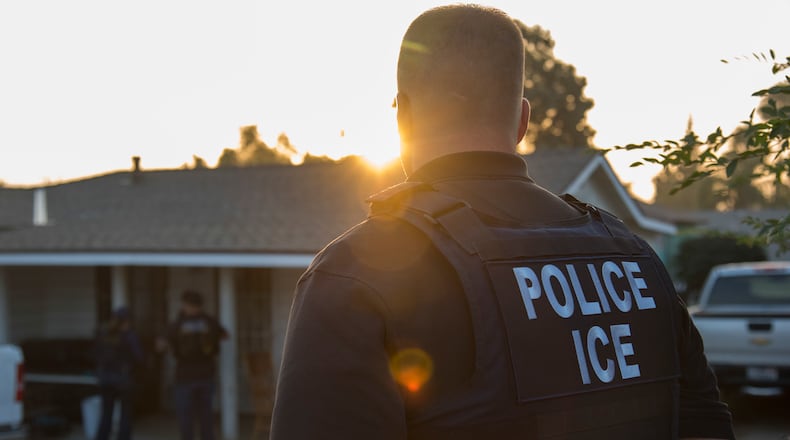To make strides toward its goal of enacting mass deportations, President Donald Trump’s administration has signaled it will lean on state and local law enforcement to boost arrests of immigrants who are in the country without authorization.
Georgia has stepped up to help.
Earlier this month, Gov. Brian Kemp announced that he wants all 1,100 sworn officers of Georgia’s Department of Public Safety to make immigration inquiries and arrests in the state. It’s a decision that marks a significant expansion in Georgia of a U.S. Immigration and Customs Enforcement program dubbed 287(g), which deputizes local officers to carry out some of the tasks of federal immigration agents.
“If you are in our country illegally and committing crimes, you have no place in Georgia,” said Kemp, who called the 287(g) expansion a “common sense measure” that aligns with Trump’s crackdown on illegal immigration.
In recent years, the Department of Public Safety has only applied 287(g) to immigrants who were already in jail.
As a result of Kemp’s decision, state troopers will play a much more active role partnering with ICE to find, interrogate and detain immigrants suspected of being in the country illegally.
According to ICE, this so-called “task force model” of the 287(g) program is a “force multiplier.” Although it is unclear if it would allow Georgia troopers to stop people solely to check their immigration status, community advocates say that looms as a distinct possibility.
“We are concerned about potential profiling and show-me-your-papers activities affecting hardworking immigrants who are no danger to anyone,” said Gigi Pedraza, executive director of the Atlanta-based Latino Community Fund.
DPS officials did not answer a request for comment from The Atlanta Journal-Constitution, or clarify when its officers would start working to find unauthorized immigrants in the community. An ICE database last updated on March 27 includes DPS among the local and state agencies actively enrolled in the program’s task force model.
The task force model had been discontinued for over a decade before being revived under Trump.
The Obama administration ended such partnerships in 2012, following a Department of Justice investigation that uncovered widespread racial profiling and other discrimination against Latinos in Arizona by deputies participating in the task force.
Among the executive orders signed on his first day back in office, Trump issued a directive for the Department of Homeland Security to again broaden the scope of 287(g) agreements, empowering law enforcement to aid in the “investigation, apprehension, or detention” of unauthorized immigrants.
Florida last month became the first to sign a Trump-era task force agreement for its state police agency. Alongside Georgia’s DPS, state-level agencies from Iowa, Kansas, Mississippi, Missouri, Montana, Oklahoma, South Carolina, Texas, Utah and Virginia have also entered into task force partnerships with ICE in recent weeks, according to a federal database.
Adelina Nicholls, co-founder of the Georgia Latino Alliance for Human Rights, said closer collaboration between Georgia law enforcement and ICE will “no doubt have a profound impact” on the immigrant community.
“People will feel like they can no longer freely go about their business, like taking their kids to school, going to work, moving from one spot to another,” she said. “The police will be dedicated to detaining our community.
“These programs, what they do is increase racial profiling.”
Blurring the lines between local law enforcement and ICE will keep some immigrants from reporting crimes, Nicholls added.
“They’ll avoid any kind of contact” with police, she said.
So far, a slew of sheriffs from states like Florida and Texas have signed their own, county-level agreements with ICE through the 287(g) task force program, but no Georgia sheriff has taken that step. That is something the Trump administration wants to change.
At a February conference in Washington, D.C., Trump’s border czar, Tom Homan, met with sheriffs from across the country and urged them to “help us on the street” by signing up for the task force. He said the administration is aiming to shorten the mandatory training requirements for local officers participating in 287(g), to encourage more partnerships.
Several Georgia sheriffs do already take part in another type of 287(g) agreement, which allows local officers to question noncitizens booked in jail on non-immigration charges and detain them for federal agents.
Following the killing of a Georgia nursing student at the hands of a Venezuelan national living in the country without authorization, the Georgia Legislature passed a law last year mandating that sheriffs apply for 287(g) or other immigration enforcement partnerships or face criminal penalties, but participation has been inconsistent. At least five local sheriffs signed up earlier this year.
About the Author
Keep Reading
The Latest
Featured

